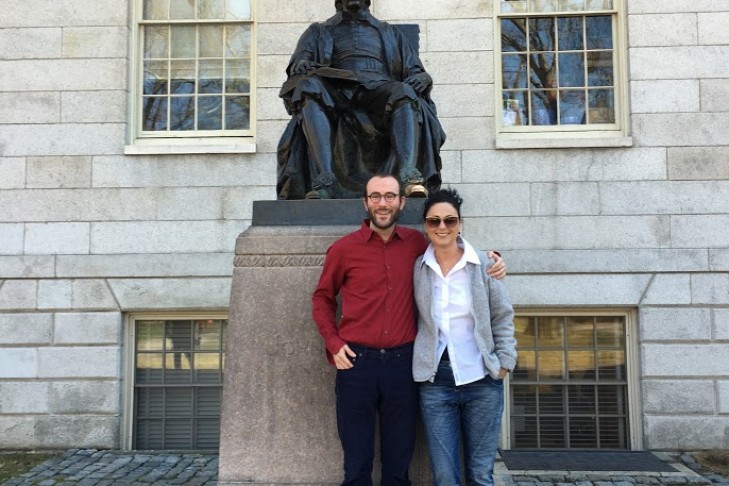It is the year of the woman playwright at Boston-based Israeli Stage. Playwright Hanna Azoulay Hasfari is this season’s writer-in-residence, the third Israeli playwright to hold the distinction. Guy Ben-Aharon, the young director who founded Israeli Stage in November 2010, says Azoulay Hasfari’s work “exemplifies the diverse backgrounds of our playwrights and looks particularly at life through the lens of an Israeli playwright.” To date, Ben-Aharon has brought over 20 translations of plays from Hebrew to English to Boston audiences.
This season in particular, notes Ben-Aharon, is “a response to the fact that when all the other theaters announced their seasons, the landscape was pretty bleak for women playwrights. We already had a play by Anat Gov on the schedule, as well as Hanna’s residency. We were close to having an all-female season and decided to showcase that fact. Since Israeli Stage was founded, at least half the playwrights have been women in a given season.”
To that end, Azoulay Hasfari’s work illuminates the plight of Moroccan Jewish women—work that she says is also autobiographical. Azoulay Hasfari, who is 55, was born in Israel into a large Moroccan family who hailed from the Atlas Mountains. The youngest of seven children, she was the only one of her siblings who was a sabra—a native Israeli. This distinction is present in her work as a playwright and documentary filmmaker. “In Israel my parents were considered to come from a ‘primitive world,’” she says. “It was a big gap between that world and modern, western Israel. Even as a child I was very aware that Israel, established by European Jews, was a melting pot in which only we had to melt.”
Azoulay Hasfari admits that as a budding writer she attempted to eschew her Mizrahi, or Arab-Jewish, identity. But “covering her identity” made her extremely unhappy. “When you are not in touch with your roots, you stop smiling, you forget how to laugh,” she says. When she returned to those roots, she focused on her mother’s story. Married at the age of 12 in Morocco, her mother gave birth to 13 children, seven of whom survived. “I idolized my mother when I was younger,” Azoulay Hasfari says. “I’m such a strong woman because of her and because of where I came from.”
Azoulay Hasfari initially reflected on her mother’s story in “Orange People,” a film she directed. “The film,” she explains, “is about the trans-generational trauma of child brides. It’s not just a problem in Morocco, but all over the world. Eighteen million girls are getting married. They’re sold as cheap merchandise and so many of them are dying.” Azoulay Hasfari brought her deep concern about the subject to the United Nations, where in 2015 she spoke about the tragic plight of child brides at the Commission on the Status of Women.
Azoulay Hasfari’s newest play, “Dina,” is another entry in her feminist oeuvre. The play, which will have its world premiere on April 1 at Brandeis University, brings together Azoulay Hasfari’s talent as a writer and her keen eye as a filmmaker. The title character, a middle-aged woman, has terminal lung cancer and hires a young filmmaker to record her life story. The play is a reckoning of a childhood trauma, and Azoulay Hasfari says she purposely modeled her protagonist on biblical Dina.
“She’s the only daughter of Jacob,” says Azoulay Hasfari. “When we read about her in the Torah, she has no voice. She doesn’t speak. We don’t know how she felt. We don’t even know if she was actually raped. Her voice is silence. I created a modern-day Dina to give her biblical ancestor the voice she deserves.” The connection between Dina and the Moroccan Jewish women of Azoulay Hasfari’s childhood is notable. “We were kind of invisible people in the public atmosphere,” she says. “The Israeli culture around me didn’t understand my people. They thought we were Arabs. In my first film, ‘Schur,’ which loosely translates as ‘Magic,’ I focused on a Moroccan family living in the 1970s, and in that way portrayed my identity.”
Azoulay Hasfari makes her home in Jaffa, a city she describes as “different from the rest of Israel. There are Arabs, Jews, Ethiopians and Russians all living together.” In many ways, the city embodies Azoulay Hasfari’s vision of a multicultural society in both her art and her life.
Hanna Azoulay Hasfari is in residence at Israeli Stage through April 3. She will be lecturing as well as premiering her new play “Dina.” Click here for information about her appearances and play.
This post has been contributed by a third party. The opinions, facts and any media content are presented solely by the author, and JewishBoston assumes no responsibility for them. Want to add your voice to the conversation? Publish your own post here. MORE



